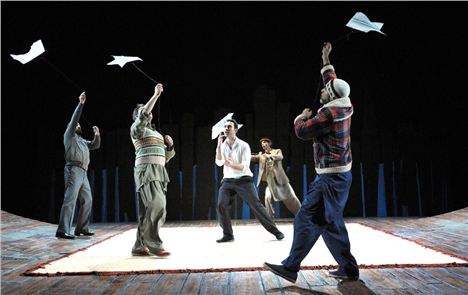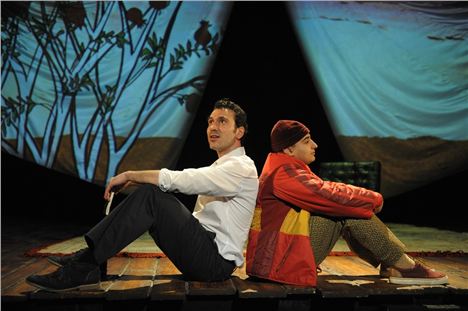BEING honest, I've never read Khaled Hosseini’s book or seen Marc Forster’s movie version before now. So, my take on The Kite Runner as a stage production is based on its merits through the cast’s acting skills and overall performance. It’s been adapted for stage by Matthew Spangler who, incidentally, put it together a full year before the film version came out.
As the drama unfolds, the sinews of
shame, casual violence and dishonour
are pulled as tight as any kite string
Some context might be useful here. This was the European premiere of a joint Liverpool and Nottingham Playhouse production, so credit must be shared between Gemma Bodinetz and Giles Croft respectively. Both deserve praise for their vision and self-belief. The Liverpool Playhouse is becoming quite expert at these kinds of adaptations as both The Odd Couple and Ladykillers proved.
The play focuses on the life experiences of Amir [Ben Turner] who grew up in relative comfort in Kabul when Afghanistan enjoyed relative peace and security in the early 1970s. It’s based on the author’s own personal journey with intimate accounts of love, honour, guilt, fear and redemption.
Kabul and Khandadhar were, then, "must-visit" destinations on the cannabis-fuelled hippie trail en route to India.
What begins as an idyllic childhood soon descends into a profound loss of innocence so raw that it probably bled off the page. As the drama unfolds, the sinews of shame, casual violence and dishonour are pulled as tight as any kite string.
Amir is introduced firstly, as a child, with his best friend Hassan [Farshid Rokey] as they play among the orchards in an upmarket district of Kabul. Interesting use of Afghan language at the beginning, though it was relatively easy to get the gist.
Amir's father, Baba [Emilio Doorgasingh], is introduced as the businesslike-but-aloof parent, while Hassan's father, Ali [Ezra Khan], is the trustworthy man-servant of 30 years standing. Crucially, they each belong to different tribes, namely the dominant Pashtun and socially-inferior Hazara. They are a tightly-knit family group but bound by traditional rules and customs.
These rules generate split loyalties and resulting dysfunctional life-chances which prove to have profound consequences as the boys grow through into adolescence. Their hopes and dreams, built like snowflakes, gradually melt as the country descends into post-coup chaos, armed insurrection and the eventual Soviet invasion in the 1980s. This leads to escape to Pakistan, then onto San Francisco and a new life. History lesson over. That said, there are twists in this particular kite’s tail which prove crucial for Amir’s personal salvation.
The story unfolds through Amir's eyes – very much a personal narrative. He’s on stage practically throughout the whole play and it’s a powerful tour-de-force. Somewhat of a miracle when you think they only had about four weeks to rehearse it.
Ben Turner certainly used every acting and emotional fibre in his repertoire to convey the deeply-dark contrasts of trust and betrayal.
Hassan’s character is the polar opposite – meek, submissive, almost willing to be bullied and treated like a dog. That’s tribalism for you. But, as the plot develops, it is very much a case of the anti-hero carrying the most moral weight with his inner strength and total honesty shining through. Farshid’s flawless performance makes sure we get the message loud and clear.
The crunch comes when he takes on being the Kite Runner to retrieve Amir’s winning kite in the big tournament. Kite flying was as popular as poppies in those days and was later banned under Taliban rule. The kite-flying scenes are impressive with some real and some imaginary strings. Wind noises come out from what look like oversize bamboo rackets whirling dervishly around. You can almost feel the breeze.
Hassan is confronted by a street-gang led by Assef [Nicholas Karimi] who’s got a gold star for sociopathic menace. No really, if any play needed a baddie, he is it and he absolutely revels in it. Scary.
This leads to them demanding Hassan hand over the kite, which he refuses out of loyalty to Amir. The male rape scene which follows is conveniently behind screens but loses none of its priapic shock value. Metaphor for how Afghanistan’s been similarly abused by superpower geopolitics over the last 100 years or so and, more recently, the Taliban? Well, perhaps.
However, Amir’s cowardly inaction by not intervening to save his friend creates a lifelong sense of guilt and self-loathing. This angst comes through in a variety of ways, perhaps none more so when Amir betrays Hassan and accuses him of theft to get him and his father removed to safety – again out of misguided loyalty. Another kite comes crashing down to the ground.
But that’s giving away too much of the plot. However, the closing scenes include a riveting gut-wrenching prayer to Allah coming from deep within Amir’s soul as though his whole life depended on it. It feels chillingly real and I swear the audience stopped breathing throughout.
There are a couple of splendid cameo performances later by General Taheri [Antony Bunsee], Rahim Khan [hugely versatile Nicholas Khan] and, in a male-dominated cast, Amir’s future love interest, Soraya [Lisa Zahra], who also has a good line in Vietnamese American.
A couple of other mentions. Firstly, Hanif Khan's amazing contribution as sole tabla player in the background gives the whole production a great sense of ethnic authenticity and is a delight to hear.
Also, Barney George's ingenious minimalist set designs, combined with William Simpson's back projections, work to create a seamless transition of sense of place which I've experienced only very rarely and succeeded on the Playhouse’s large stage. Cue the silent swish of virtual Arabesque curtains followed by a Frisco skyline at night.
It was all quite magical.
9/10
*The Kite Runner, until Saturday 6th July at the Liverpool Playhouse. Evenings: 7:30pm (except Twilight performance: Wed 26th June at 5:30pm). Matinées: 1.30pm on Thursday 20th & 27th June and 4th July, 2pm on Sat 22nd & 29th June and 6th July. Afterwords: Wednesday 26th June










